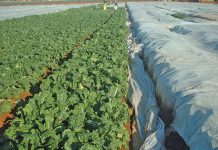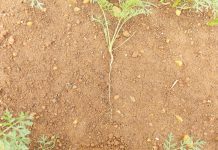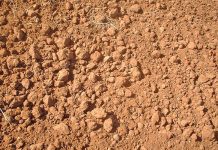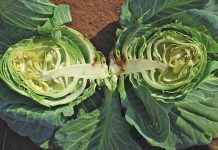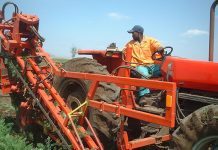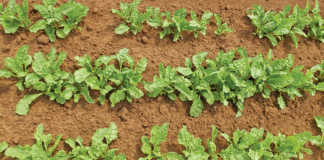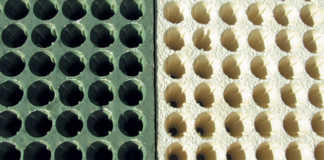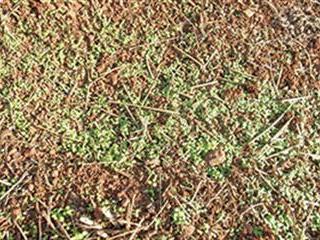
One practice I’ve had great success with is using herbicide ‘strategically’. Be warned, though, that there are no registered herbicides for this crop, so any that you use are at your own risk. I’ve found that applying Dual to the demarcated area about a week or 10 days before planting works effectively. The timing is based on when broadleaf weeds emerge, which is influenced by the temperature, as well as the species of weed. After Dual is applied, the area is irrigated.
Weed control and Germination
Dual works well against grasses and a number of broadleaf weeds. It can also be effective against yellow nutsedge (Cyperus esculentus). Irrigation activates the herbicide and stimulates broadleaf weeds not controlled by Dual to germinate. There are unlikely to be any grass weeds unless runners such as kweek (Cynodon spp. or Paspalum distichum) are present. The herbicide will control these when there is only seed present.
The plan here is to get anything that will germinate to do so before the crop plants emerge. There are a couple of options. When the weeds start to germinate, soak the crop seed in warm water as described in a previous article. In this case, it’s best to apply a second irrigation when seed soaking commences. When the seeds are at the point of germination, the soil must be moist, but not too wet to work with.
The seeds are then planted in this moist soil. As germination has already been initiated, the root will enter the soil and become established, with no further irrigation needed for some time. Now comes the tricky part: to fit in another herbicide before the crops emerge. To do this, begin by monitoring the progress of the seedlings daily. Then, shortly before they emerge, spray the area with a light application of Paraquat at a strength of 500ml to 1l/ha.
This will kill off all the weed seedlings on the same day but will have no effect on the plants, which are still underground.
why this treatment works The method described above has two advantages. Firstly, there’s usually very little weed emergence for a while after treatment. The Dual will last for some time and weeds not controlled by it would most likely have germinated if able to.
Some weeds are hard-seeded and will germinate at different times, but after the stimulus provided by land preparation and irrigation, these should emerge only later, when the threat to the crop is minimal. The second advantage is that the crop is already well on its way with no weeds present. This clearly gives it a head start. Also, by avoiding additional irrigation to get the seeds growing, there’s no chance of a crust forming in soils that are prone to this problem.
Another option is to use the strategy described, but instead of soaking the seed to the point of germination, plant the dry seed. In this case, you have to plant the seed deep enough so it doesn’t dry out to the point where further irrigation is required to get the crop to emerge. If you get this wrong, some seeds may germinate and others not. It may even happen that germination starts and due to a lack of water, the newly emerged root dies out. For this reason, pre-soaking is the preferred option.
Depending on the situation, apply this strategy to strips if wide spacing is used. Alternatively, treat the whole area.
Above all, you should always plan ahead carefully, and go with what works for you.

